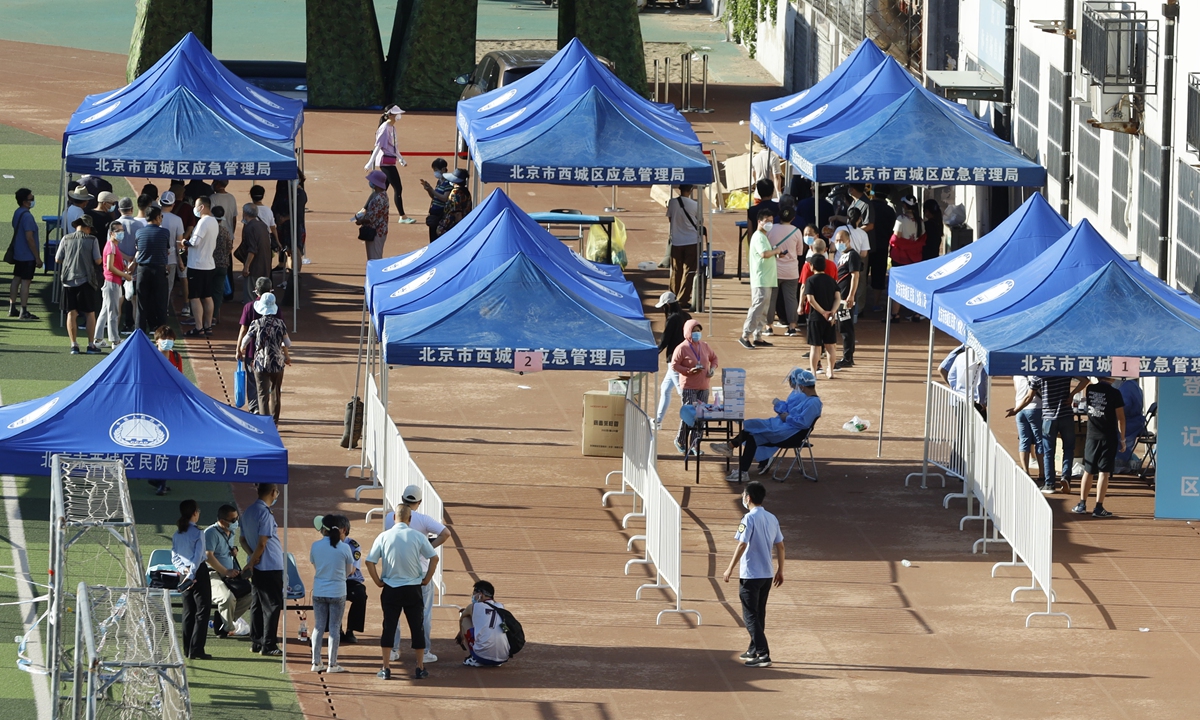Capital screens for COVID-19
By Zhao Yusha and Wang Qi Source:Global Times Published: 2020/6/18 21:43:40
Door-to-door campaign, big data get 700,000 tested

Residents follow a health worker to a testing station at a sports center in Xicheng district after Beijing municipal government demanded all residents who visited the Xinfadi food market since May 30 to undergo nucleic acid tests for possible infection with the novel coronavirus after the city reported 51 confirmed COVID-19 cases as of Sunday. Photo: Li Hao/GT
Every Beijinger has heard it. "Have you been to Xinfadi Market during the past 15 days?" The question pops up n message boxes, in notices posted by community workers on walls, and from community officials in person or on the phone.
To screen close contacts of the market, the municipal government is knocking on doors as well as using big data, artificial intelligence and cloud computing, and conducting large-scale nucleic acid tests.
The city has taken throat swabs from 356,000 people since June 13. It finished testing of 355,000 people with ties to Xinfadi on Wednesday. The number of people involved is 700,000, media reported.
Speaking at a Thursday news conference, Beijing municipal government spokesman Xu Hejian said that the city faces a severe outbreak and is striving to locate all close contacts of confirmed cases as soon as possible.
Zhang Ge, a deputy head of Beijing's COVID-19 prevention team, said on Thursday that close contacts must undergo a 14-day quarantine and take throat swab tests twice.
Daxing district has cooperated with mobile phone operators to send messages to its residents, who may have been near Xinfadi Market after May 30 according to big data.
Even people who just passed by in a car or bus got the message.
Wang Guangfa, a respiratory expert at Peking University First Hospital who lives in Daxing district, told the Global Times that he received such a message and was advised to get a throat swab test at a hospital.
Since most people have smartphones, their signals are received by local base stations run by mobile carriers, according to telecom industry analysts.
Xue Lan, a professor and former dean at the School of Public Policy and Management at Tsinghua University in Beijing, said loopholes persist because many people have turned off their GPS signals. So part of the screening has to be done by community workers or rely on residents' consciousness, said Xue.
A video circulating on China's Sina Weibo showed an elderly man, sweating as he pressed doorbells one by one in a residential building at 10 pm, asking whether the tenants had been to Xinfadi.
Beijing has dispatched more than 100,000 community workers to carry out blanket screening at all hours.
Ma Li, an official in a community in Beijing's Chaoyang district, told the Global Times that screeners call, text or knock on the door of every resident in her jurisdiction, asking whether they have been to Xinfadi Market in the past 14 days.
"We are very nervous those days. Sometimes we work from midnight to dawn, non-stop. Most residents are honest and cooperative," said Ma.
Some Beijingers also took the test on their own initiative.
One surnamed Li told the Global Times that he just completed his nucleic acid test on Wednesday, few days after returning to the capital from his hometown in Shandong Province.
"I'm doing the test mainly just to assure my relatives back home that I am safe, and they are safe as well," said Li.
A Global Times reporter found that about 500 people queued for COVID-19 nucleic acid tests in a community on Balizhuang street, Chaoyang district on Thursday afternoon. Many of them are service industry employees, like cooks and delivery men.
Community staff told the Global Times that these people were getting tests by arrangement with their employers.
RELATED ARTICLES:
Posted in: SOCIETY,FOCUS